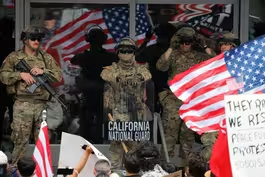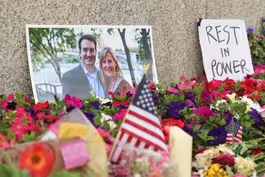
Can Trump’s ‘big, beautiful bill’ pass the Senate?
Clip: 6/17/2025 | 5m 20sVideo has Closed Captions
Can Trump’s ‘big, beautiful bill’ make it through the Senate?
It’s crunch time in Congress as Republican Senate leaders try to shape the president’s so-called “big beautiful bill” into a compromise that can pass. Lisa Desjardins joins Amna Nawaz to unpack the latest proposed changes to health care, tax, and energy policy – and the political sticking points between the GOP and a legislative victory.
Problems playing video? | Closed Captioning Feedback
Problems playing video? | Closed Captioning Feedback
Major corporate funding for the PBS News Hour is provided by BDO, BNSF, Consumer Cellular, American Cruise Lines, and Raymond James. Funding for the PBS NewsHour Weekend is provided by...

Can Trump’s ‘big, beautiful bill’ pass the Senate?
Clip: 6/17/2025 | 5m 20sVideo has Closed Captions
It’s crunch time in Congress as Republican Senate leaders try to shape the president’s so-called “big beautiful bill” into a compromise that can pass. Lisa Desjardins joins Amna Nawaz to unpack the latest proposed changes to health care, tax, and energy policy – and the political sticking points between the GOP and a legislative victory.
Problems playing video? | Closed Captioning Feedback
How to Watch PBS News Hour
PBS News Hour is available to stream on pbs.org and the free PBS App, available on iPhone, Apple TV, Android TV, Android smartphones, Amazon Fire TV, Amazon Fire Tablet, Roku, Samsung Smart TV, and Vizio.
Providing Support for PBS.org
Learn Moreabout PBS online sponsorshipAMNA NAWAZ: It's crunch time in Congress, where Senate Republicans have released their latest version of the president's so-called big, beautiful bill, and it differs notably from the version passed by House Republicans.
Lisa Desjardins is here to unpack the latest proposed changes and the political sticking points.
Good to see you.
LISA DESJARDINS: Good to see you.
AMNA NAWAZ: So tell us about the changes that the Senate made.
What are they?
LISA DESJARDINS: First, one note.
I want to remark that today there was an unusual atmosphere on Capitol Hill.
It felt a bit like a place on edge.
Part of that are the stakes in this bill.
It could be one of the historically largest in history.
So I want to talk about Senate Republicans' draft of some key provisions.
So let's look at what they would change from House Republicans.
First of all, they would increase the child tax credit and make it permanent.
They would make some business tax cuts permanent as well.
For Medicaid, more cuts in this Senate draft than there are in the House-passed bill.
And for solar and wind, those tax credits that are being cut, the Senate would slightly delay them more, but ultimately they would still eliminate them, Senate Republicans.
One more change that is notable, one of my fellow reporters noticed this first.
There's gun provisions in this bill.
Remember in the House bill that they ended taxes on silencers.
Well, in the Senate bill, they do that, but they also extend that to short-barreled shotguns and rifles, so no taxes and also no regulations.
Those would no longer be firearms in this Senate bill.
AMNA NAWAZ: Interesting.
So we know the president wants this bill passed by July 4.
Where does this stand in Congress?
Is it on track to do that?
LISA DESJARDINS: Right now, it's going the other way.
We have seen more Republicans move away from the bill in the last day.
Let me give you five reasons why.
Let's look at these five senators in particular who are opposed to some of the Medicaid cuts in this Senate bill.
One of them, you may not have seen before, Jim Justice there on the top row, of West Virginia.
He came out today and said these increased Medicaid cuts in this Senate draft, he doesn't like them as much as he liked the House provisions.
Now, that's just one part of the issue.
There are other senators with other problems in this bill.
In all, they want to get through both chambers by July 4.
I think it would be a win for Republicans if they can get it through the Senate by July 4.
AMNA NAWAZ: You have also been reporting on rising tensions, rising security concerns especially for lawmakers themselves, and that's following this weekend's horrific shootings in Minnesota.
What are you hearing from lawmakers on this?
LISA DESJARDINS: This is what I'm talking about also, a place that was on edge and even felt a little bit frayed on Capitol Hill.
Now, part of what senators are reckoning with, of course, the murder of those two state lawmakers in Minnesota, the shooting of two others there.
They have been talking about this.
And someone familiar told me that there were two lists of lawmakers, one in the gunman's car and then one also where he lived.
And that included many members of Congress.
So we saw yesterday Senator Tina Smith of Minnesota -- there's one of the photos there from my colleague Jamie Dupree -- talking to Senator Mike Lee of Utah.
He had put out on social media the idea that Democrats were to blame for this.
And that caused outrage across parties.
Today, Mike Lee took those social media posts down.
He said it was the right thing to do.
I talked to Senator Smith extensively.
She said she still hadn't gotten a real apology.
This was on a day when there's also a security briefing for members that left many of them sober.
Threats against members of Congress have risen to 9,000 in the last year.
Many of them calling for more protection.
They don't have the resources for that right now.
AMNA NAWAZ: You have also been following the story of California Senator Padilla.
He was handcuffed last week when he interrupted a press conference that the homeland security secretary was hosting in Los Angeles.
What's the latest on the senator?
LISA DESJARDINS: That's right.
I also spoke with him today.
And he spoke to the public, going to the Senate floor today, giving a speech on his experience, where he detailed his experience being handcuffed, pushed down to the ground.
And I have learned today that he had a National Guard representative and an FBI member escorting him into the room.
What Democratic senators are talking about a great deal is the fact that neither that FBI agent nor the National Guardsmen stood up for him or protected him.
And that's something that I have had members of both parties say was a concern.
He was trying to identify himself.
But those who were with him in official capacity did not stand up for him.
AMNA NAWAZ: And, finally, amid all the things you're covering, Lisa, the Senate passed a major bipartisan compromise today on cyber currency.
What should we know about that?
LISA DESJARDINS: Let's talk about this quickly.
It is important.
This is a bill called the GENIUS Act.
I'm going to talk to you about what's in it.
Let's go through it quickly.
This would be -- this is something that regulates something called stablecoins, which are cyber currency attached to a real asset like gold or dollars.
Now, this would include consumer protections for this very nascent industry.
This would be the first cyber currency law if it gets all the way through Congress, bipartisan.
It just passed the last couple of minutes in the U.S. Senate, last hour or so.
It's significant because some people say, oh, cyber currency, is that serious?
Here's the U.S. Congress taking it seriously.
If this bill or some form of it gets through all of Congress, some people think the floodgates will open in that industry.
One last thing, this bill does say us members of Congress cannot profit off of stablecoins, but it doesn't say whether the president can.
And some Democrats say that's a huge problem for a president whose family clearly is getting in that business.
AMNA NAWAZ: Lisa Desjardins quite literally covering it all on Capitol Hill.
Lisa, thank you.
LISA DESJARDINS: You're welcome.
Former Fulbright board member on Trump’s interference
Video has Closed Captions
Clip: 6/17/2025 | 6m 18s | Why Fulbright board members resigned in mass last week (6m 18s)
How AI startups hope to help feed India
Video has Closed Captions
Clip: 6/17/2025 | 8m 4s | Can AI help solve India’s food and water insecurity? (8m 4s)
How immigration crackdowns are affecting Latino communities
Video has Closed Captions
Clip: 6/17/2025 | 10m 16s | Pastors share how immigration crackdowns are affecting their communities (10m 16s)
Israel’s war against Iran poses challenges for Trump team
Video has Closed Captions
Clip: 6/17/2025 | 11m 50s | Trump faces difficult choices in support for Israel’s war on Iran (11m 50s)
News Wrap: Appeals court hears Trump National Guard case
Video has Closed Captions
Clip: 6/17/2025 | 4m 30s | News Wrap: Court considers Trump’s California National Guard deployment (4m 30s)
Understanding political violence, and how to fix it
Video has Closed Captions
Clip: 6/17/2025 | 6m 5s | Understanding the root causes and possible solutions for rising political violence (6m 5s)
Providing Support for PBS.org
Learn Moreabout PBS online sponsorship
- News and Public Affairs

FRONTLINE is investigative journalism that questions, explains and changes our world.

- News and Public Affairs

Amanpour and Company features conversations with leaders and decision makers.












Support for PBS provided by:
Major corporate funding for the PBS News Hour is provided by BDO, BNSF, Consumer Cellular, American Cruise Lines, and Raymond James. Funding for the PBS NewsHour Weekend is provided by...





